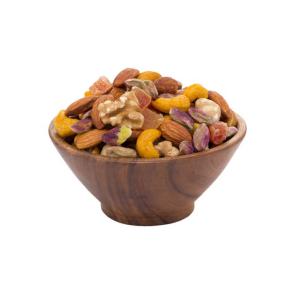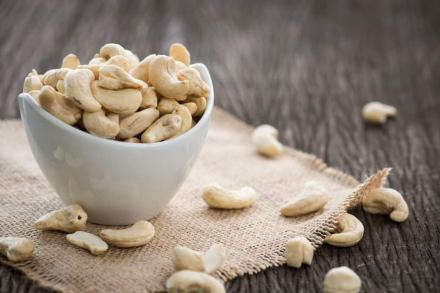Almonds, often referred to as the “King of Nuts,” are not just a delicious snack, but they also pack a powerful nutritional punch. These nutrient-dense nuts are not only versatile in the culinary world but also offer a wide range of health benefits. From their impressive nutrient profile to their potential health perks, almonds have earned their spot as a superfood that deserves a closer look. Nutrient Profile of Almonds: Almonds are a rich source of nutrients that are essential for overall well-being. These nuts are packed with healthy fats, protein, fiber, vitamins, and minerals that play a crucial role in supporting various bodily functions. A one-ounce serving of almonds (approximately 23 almonds) contains: – Calories: 164 – Protein: 6 grams – Fat: 14 grams (9 of which are monounsaturated fats) – Carbohydrates: 6 grams – Fiber: 3.5 grams – Vitamin E: 7.3 mg (37% of the Daily Value) – Magnesium: 76 mg (19% of the Daily Value) – Manganese: 0.6 mg (32% of the Daily Value) The healthy fats present in almonds, particularly monounsaturated fats, are beneficial for heart health and can help reduce the risk of cardiovascular diseases.

.
Additionally, almonds are an excellent source of plant-based protein, making them a great snack choice for those following vegetarian or vegan diets. Health Benefits of Almonds: 1. Heart Health: Almonds are known to promote heart health due to their high content of monounsaturated fats, antioxidants, and magnesium. These nutrients help lower cholesterol levels, reduce inflammation, and improve overall heart function. 2. Weight Management: Despite being calorie-dense, almonds can actually aid in weight management when consumed in moderation. The combination of protein, fiber, and healthy fats in almonds helps promote satiety and can prevent overeating. 3. Blood Sugar Control: Almonds have a low glycemic index, which means they have minimal impact on blood sugar levels. This makes them a suitable snack option for individuals with diabetes or those looking to maintain stable blood sugar levels. 4. Bone Health: Almonds are a good source of calcium, magnesium, and phosphorus, all of which play a vital role in maintaining strong and healthy bones. Regular consumption of almonds can help prevent conditions like osteoporosis. 5. Skin Health: The vitamin E content in almonds contributes to healthy skin by protecting it from oxidative damage.
..
 Almonds also contain antioxidants that help combat signs of aging and promote a youthful complexion. Incorporating Almonds into Your Diet: There are numerous ways to enjoy the nutritional benefits of almonds. Whether you prefer snacking on whole almonds, adding almond butter to your smoothies, or using almond flour in your baking recipes, the options are endless. Here are some creative ways to incorporate almonds into your diet: 1. Snack on a handful of raw or roasted almonds for a quick and satisfying energy boost. 2. Add sliced almonds to your morning oatmeal, yogurt, or salads for a crunchy texture. 3. Use almond milk as a dairy-free alternative in your coffee, cereal, or baked goods. 4. Spread almond butter on whole grain toast or use it as a dip for apple slices. 5. Bake with almond flour to create delicious and gluten-free treats like almond flour pancakes or almond meal muffins. Selecting and Storing Almonds: When choosing almonds, opt for raw or dry-roasted varieties without added salt or sugar. It’s best to store almonds in an airtight container in a cool, dark place to maintain their freshness and prevent oxidation. Alternatively, you can store almonds in the refrigerator or freezer to extend their shelf life. Almond Allergies and Precautions: While almonds offer a host of health benefits, it’s important to note that some individuals may have allergies to tree nuts, including almonds. Allergic reactions to almonds can range from mild symptoms like itching and hives to severe reactions such as anaphylaxis. If you have a known nut allergy, it’s crucial to avoid almonds and products containing almonds to prevent adverse reactions. Conclusion: Almonds are not just a tasty snack; they are a nutritional powerhouse that offers a wide array of health benefits. From supporting heart health and weight management to promoting skin health and bone strength, almonds deserve their reputation as a superfood. By incorporating almonds into your diet in various creative ways, you can harness their nutrient-rich goodness and take a step towards a healthier lifestyle. So, grab a handful of almonds and enjoy the delicious and nutritious goodness that these nuts have to offer.
Almonds also contain antioxidants that help combat signs of aging and promote a youthful complexion. Incorporating Almonds into Your Diet: There are numerous ways to enjoy the nutritional benefits of almonds. Whether you prefer snacking on whole almonds, adding almond butter to your smoothies, or using almond flour in your baking recipes, the options are endless. Here are some creative ways to incorporate almonds into your diet: 1. Snack on a handful of raw or roasted almonds for a quick and satisfying energy boost. 2. Add sliced almonds to your morning oatmeal, yogurt, or salads for a crunchy texture. 3. Use almond milk as a dairy-free alternative in your coffee, cereal, or baked goods. 4. Spread almond butter on whole grain toast or use it as a dip for apple slices. 5. Bake with almond flour to create delicious and gluten-free treats like almond flour pancakes or almond meal muffins. Selecting and Storing Almonds: When choosing almonds, opt for raw or dry-roasted varieties without added salt or sugar. It’s best to store almonds in an airtight container in a cool, dark place to maintain their freshness and prevent oxidation. Alternatively, you can store almonds in the refrigerator or freezer to extend their shelf life. Almond Allergies and Precautions: While almonds offer a host of health benefits, it’s important to note that some individuals may have allergies to tree nuts, including almonds. Allergic reactions to almonds can range from mild symptoms like itching and hives to severe reactions such as anaphylaxis. If you have a known nut allergy, it’s crucial to avoid almonds and products containing almonds to prevent adverse reactions. Conclusion: Almonds are not just a tasty snack; they are a nutritional powerhouse that offers a wide array of health benefits. From supporting heart health and weight management to promoting skin health and bone strength, almonds deserve their reputation as a superfood. By incorporating almonds into your diet in various creative ways, you can harness their nutrient-rich goodness and take a step towards a healthier lifestyle. So, grab a handful of almonds and enjoy the delicious and nutritious goodness that these nuts have to offer.
…
The versatility of almonds extends beyond just snacking; their mild flavor and crunchy texture make them a popular ingredient in both sweet and savory dishes. Almond-based products, such as almond milk, almond flour, and almond butter, have also gained popularity in recent years due to their various health benefits and dietary preferences. Let’s explore some of the ways almonds can be incorporated into a wide range of recipes: 1. Almond Milk: Almond milk is a dairy-free alternative to cow’s milk that is made by blending almonds with water and straining out the pulp. This creamy and slightly nutty milk is a versatile ingredient that can be used in both sweet and savory recipes. It’s an excellent option for those who are lactose intolerant, vegan, or looking to reduce their dairy consumption. Almond milk can be enjoyed in cereals, smoothies, coffee, and baked goods. It’s also a great addition to soups, sauces, and curries for a subtle nutty flavor. 2. Almond Flour: Almond flour, made from finely ground blanched almonds, is a popular gluten-free alternative to traditional wheat flour. It’s widely used in baking to create moist and tender baked goods with a slightly nutty flavor. Almond flour is rich in protein, healthy fats, and fiber, making it a nutritious choice for those following a low-carb or gluten-free diet. Use almond flour in recipes for pancakes, muffins, cookies, and cakes for a healthier twist on your favorite treats. 3. Almond Butter: Almond butter is a creamy spread made from roasted almonds that can be enjoyed on toast, crackers, fruit, or used as a dip for vegetables. It’s a rich source of healthy fats, protein, and fiber, making it a satisfying and nutritious snack option. Almond butter can also be incorporated into sauces, dressings, smoothies, and desserts for added flavor and creaminess. Look for natural almond butter with no added sugar or oil for the purest and healthiest option.




Your comment submitted.